|
|
|
Sort Order |
|
|
|
Items / Page
|
|
|
|
|
|
|
| Srl | Item |
| 1 |
ID:
134072
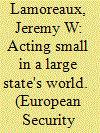

|
|
|
|
|
| Publication |
2014.
|
| Summary/Abstract |
The interest in small states ebbs and flows as important international affairs include small states. Russia's actions and policies vis-à-vis Ukraine, and the resultant intensified apprehension among Russia's smaller neighbours, aim the proverbial microscope at the size and power discrepancies between states. Russia, by most metrics, is a large state and the Baltic states, by those same metrics, are small states. Small-state scholars expect large and small states to act differently. However, the case of Russia and the Baltic states indicates that large and small states do not, in fact, act all that different. This being the case, this article calls into question many of the assumptions made by small-state scholars about the difference between large- and small-state action and argues for changes within small-state studies as a subdiscipline of the larger international relations discipline.
|
|
|
|
|
|
|
|
|
|
|
|
|
|
|
|
| 2 |
ID:
053035
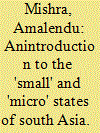

|
|
|
| 3 |
ID:
159414


|
|
|
|
|
| Summary/Abstract |
The foreign policy of Ceylon under the premiership of D.S. Senanayake maintained
a distinct alignment with its former coloniser Great Britain. The zenith
of this relationship was the defence agreement which came into effect upon
independence in 1948. Utilising the existing scholarship on neorealism and the
concept of security dilemma, analysis of the reasons behind this strategic alignment
exposes the threat perception Ceylon faced from its regional hegemon,
India. This study surveys such threat perceptions faced by the island at the time
of independence and argues that this led to a balancing strategy with Britain. It
first locates Ceylon’s foreign policy employing the taxonomies of balancing, bandwagoning
and hedging and then examines how Ceylon’s extra-regional alignment
with the UK enabled her to eschew from a security dilemma with India.
|
|
|
|
|
|
|
|
|
|
|
|
|
|
|
|
| 4 |
ID:
172314


|
|
|
|
|
| Summary/Abstract |
International treaties require ratification to go into effect. But while some treaties have high ratification rates, many do not, leading to a system where issues appear to be addressed on paper but are not in practice. This article seeks to address why treaties receive varying levels of support and finds that factors present during the negotiation phase of the agreement affect the ratification phase. Specifically, bargaining power at and away from the negotiation table influences both the substantive nature of the treaty and the extent to which it will be widely ratifiable. This article explores this issue both in a statistical analysis and in two pairs of qualitative case studies. The evidence indicates that negotiation processes cast a long shadow on the fate of international agreements leading to the current treaty system of prolific international law that is not ratified by most states.
|
|
|
|
|
|
|
|
|
|
|
|
|
|
|
|
| 5 |
ID:
088065


|
|
|
|
|
| Publication |
2009.
|
| Summary/Abstract |
Many scholarly analyses of small economies over the past two decades have been premised on the implicit understanding that a state's small population size, compounded by such factors as islandness and remoteness from markets, is to blame for an inherent and unavoidable economic vulnerability. The article critiques the core features of this approach, and proposes in turn to discuss and profile the development trajectories of small economies from the vantage point of the strategic flexibility used by small states (at multiple levels as individuals, household units, corporate entities and complete jurisdictions) in seeking to exploit opportunities and maximize economic gains in a turbulent and dynamic external environment with which they must engage. Keeping alive a portfolio of skills and revenue streams enables these actors to migrate inter-sectorally as well as trans-nationally.
|
|
|
|
|
|
|
|
|
|
|
|
|
|
|
|
| 6 |
ID:
173158


|
|
|
|
|
| Summary/Abstract |
There is an extensive and rapidly growing body of literature on armed Unmanned Combat Aerial Vehicles (UCAVs) focused on the US War on Terror. However, smaller Unmanned Aerial Vehicles for military use, or what this paper refers to as tactical UAVs utilised by small states, have received much less scholarly attention ̶ despite their rapid proliferation in the last decade. In order to start rectifying this dual neglect of more limited UAVs employed by small states, the paper makes an empirical contribution to the study of tactical UAVs. Drawing on a substantial number of interviews and studies commissioned by the Swedish Armed Forces, the paper examines the Swedish UAV program, which is in certain ways representative of a smaller state’s efforts to incorporate UAVs into its armed forces. The paper argues that it is crucial to think in terms of systems rather than the UAV as a free-standing resource to be used on its own. If utilized along with other ISR assets, tactical UAVs may have a significant role to play in asymmetric conflicts.
|
|
|
|
|
|
|
|
|
|
|
|
|
|
|
|
| 7 |
ID:
152972
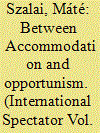

|
|
|
|
|
| Summary/Abstract |
Smaller members of the Gulf Cooperation Council defied theoretical and practical expectations as they were able to enlarge their international influence during the years of the Arab Spring. They adopted markedly different foreign policy strategies, which can be seen as stances lying between accommodation and opportunism, depending on the extent to which they respected the security concerns of their geopolitical patron, Saudi Arabia. The mainstream schools of IR theory – neorealism, neoliberalism and constructivism – offer different explanations for these phenomena. Although none of the three schools can provide a completely exhaustive explanation, neoliberalism seems to offer the most comprehensive framework for analysis.
|
|
|
|
|
|
|
|
|
|
|
|
|
|
|
|
| 8 |
ID:
166748
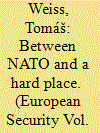

|
|
|
|
|
| Summary/Abstract |
Defence spending has become a primary issue in the context of NATO. The question of fair burden-sharing and development of new capabilities in reaction to the changing security environment led NATO members to aim to spend 2% of GDP on defence by 2024. While some allies have managed to reach the level quickly, others seem not to be able or willing to do so. We know little, however, how the international commitment is reflected and referred to in individual member states. This article shows how size played a role when the 2% pledge was discussed in domestic politics, even if the resulting policy may be very similar. Based on expert and political debates in Germany and Czechia, it demonstrates that external expectations and the question of status play a crucial part in the small state’s reasoning whereas it is mainly internal drivers that shape the big state’s decisions.
|
|
|
|
|
|
|
|
|
|
|
|
|
|
|
|
| 9 |
ID:
117857


|
|
|
|
|
| Publication |
2012.
|
| Summary/Abstract |
The role of small states has been largely neglected in research on the process and outcome of multilateral negotiations. Even though these states may be active in the agenda-setting processes or display a specific engagement in certain thematic aspects of negotiations, in the end game the outcome of negotiations has been perceived to be dependent on the bargaining between major powers. However, small states also have strategies at their disposal to compensate for these weaknesses. Two principal ones come to mind, prioritization or niche diplomacy, and coalition-building to join forces with like-minded states in order to draw on their resources, expertise and manpower. In the article, we compare two cases of small state coalitions in multilateral negotiations, namely the Like Minded (LM) group in the negotiations that led to the establishment of the International Criminal Court (ICC), and the Alliance of Small Island States (AOSIS) in United Nations climate negotiations. While the two coalitions resort to similar strategies, they have not been comparably successful. We will show that the ability to translate discursive power into measurable effects on outcomes ultimately depends on the institutional setting of the negotiations and the nature of the issue that coalitions are tackling.
|
|
|
|
|
|
|
|
|
|
|
|
|
|
|
|
| 10 |
ID:
176571
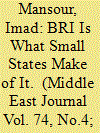

|
|
|
|
|
| Summary/Abstract |
Kuwait's expanding engagement with China's Belt and Road Initiative (BRI) sheds light on its strategies to meet its socioeconomic needs and navigate the Gulf's adversarial politics. The BRI presents a good case study of how the Kuwaiti leadership evaluates the benefits of and dilemmas created by asymmetric structural relationships. This article thus explores how governmental agency in strategically managing massive financial assets complicates our understanding of the vulnerability of so-called small states.
|
|
|
|
|
|
|
|
|
|
|
|
|
|
|
|
| 11 |
ID:
140418


|
|
|
|
|
| Summary/Abstract |
Existing debates suggest that small states can exert more influence than their size alone implies. This article contributes to such extant literature by addressing more specific questions about the conditions under which such ostensible price takers can play outsized roles. Generic claims of tiny Singapore punching above its weight have not yet been examined in light of its leaders' proactive initiatives in global governance to advance its national interests. Drawing on two strategies identified within theoretical debates on how small states project influence, this article analyzes Singaporean initiatives in coalition building and use of its comparative advantages in specific issue domains and how these strategies have evolved historically. Driven by an innate sense of vulnerability, Singapore's flexibility to embrace emerging modes of governance beyond its traditional UN-centric focus is a relatively overlooked feature in the literature deserving further attention.
|
|
|
|
|
|
|
|
|
|
|
|
|
|
|
|
| 12 |
ID:
103862
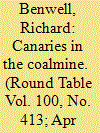

|
|
|
|
|
| Publication |
2011.
|
| Summary/Abstract |
Climate change presents a useful case in the study of small states because their interests can be differentiated from larger states. Small states are expected to respond to international politics, not to lead. The development of the climate regime has seen small states engage in a 'grand strategy' to achieve climate change mitigation. The apparent powerlessness of small states and the nature of the public good problem are central to understanding small states' negotiating power in the climate regime. They have capitalised on their victim status and the common interests of all states to act as regime leaders; but they have not achieved all of their objectives in terms of access to finance and technology. This suggests that while small states share the difficulties of other developing states in pursuing value-claiming goals, they may have a comparative advantage as norm-entrepreneurs.
|
|
|
|
|
|
|
|
|
|
|
|
|
|
|
|
| 13 |
ID:
078938
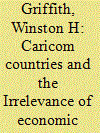

|
|
|
|
|
| Publication |
2007.
|
| Summary/Abstract |
The pioneers of development argued that natural resources determined a country's economic structure of production. Since a small country would of necessity have a smaller endowment of natural resources than a large country, they further argued that the economic structure of production of a small country would be more concentrated than that of a large country. This article contends that economic smallness is no longer an important determinant of a country's economic structure of production. The global economy is becoming more and more integrated and knowledge skills have become the most important resource in production processes. If, therefore, small countries such as those in Caricom can accumulate in sufficient quantities the appropriate knowledge skills, they can have a diversified economic structure of production by developing new products and services, and by attracting foreign direct investment
|
|
|
|
|
|
|
|
|
|
|
|
|
|
|
|
| 14 |
ID:
160957
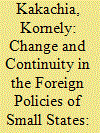

|
|
|
|
|
| Summary/Abstract |
The 2012 parliamentary elections witnessed Georgia’s first peaceful post-independence transfer of power. Under Bidzina Ivanishvili, the government formed by the Georgian Dream Coalition significantly softened the harsh anti-Russia rhetoric of Saakashvili’s ‘National Movement’, launching a policy aimed at normalising relations with Russia. Such a shift of a steady, almost decade-long counter-Russian foreign policy resists explanation by structural theories on small states located in relatively stable external environments. Mapping discursive changes and employing a constructivist framework, we argue that distinct foreign policy visions are reflections of the differences between the identities of the two leadership camps.
|
|
|
|
|
|
|
|
|
|
|
|
|
|
|
|
| 15 |
ID:
152931


|
|
|
|
|
| Summary/Abstract |
Some scholars believe that as China’s power grows more preponderant, it will leverage its growing might to impose its will on others in the international system. This article engages this debate by probing China’s relationship with small states, going beyond those in its region. Small states are particularly apposite because their size and power deficiencies suggest they are among the most vulnerable to pressure or coercion from big powers such as China. Beijing’s diplomacy towards small states, therefore, represents a barometer of Chinese restraint and exercise of its power in a situation of clear power superiority. The article studies this dynamic, unpacking the contours and shape of China’s relations with small states, as well as the narratives and rationales that drive this relationship.
|
|
|
|
|
|
|
|
|
|
|
|
|
|
|
|
| 16 |
ID:
171036


|
|
|
|
|
| Summary/Abstract |
This article sheds light on the factors shaping China’s Maritime Silk Road Initiative (MSRI) in small states through a study of Djibouti and the MSRI. It also analyses the establishment of China’s first overseas military base and thus evaluates the military-security implications of Chinese MSRI ports. Among other things, it shows that we need to conceive the locational value of MSRI participants more richly, that the existence of an authoritarian partner has advantages for China, but does not necessarily drive MSRI activities, and that small MSRI states have agency vis-à-vis China. It suggests, too, there is a template of Chinese port development and that it should not be assumed that China is intentionally wielding the ‘debt trap’ to gain equity.
|
|
|
|
|
|
|
|
|
|
|
|
|
|
|
|
| 17 |
ID:
186065
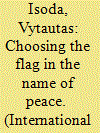

|
|
|
|
|
| Summary/Abstract |
The twenty-first century peacekeeping landscape is defined by the multiplicity of institutional frameworks under which international operations are deployed. Small states with limited resources cannot meet every demand for troop contributions and face the inevitable dilemma of choosing whose ‘flag’ to carry. For the first decade after joining NATO and the EU, the Baltic States gave a clear priority to NATO and U.S.-led military operations, but since the 2014 Ukrainian crisis gradually shifted their focus to the UN framework. Drawing on interviews with policy-makers in the three Baltic countries this article aims to explain this recent shift. It reviews the main theoretical assumptions about troop contributions to the UN peacekeeping operations and burden-sharing behaviour among NATO allies, and suggests that the recent troop deployment decisions of the Baltic States are best explained by a realist focus on national security concerns. The seemingly ‘internationalist’ context of UN peacekeeping operations simply happened to be most suitable for a bilateral exchange with their European allies, namely Germany and France, that in turn contributed troops to NATO's Baltic flank.
|
|
|
|
|
|
|
|
|
|
|
|
|
|
|
|
| 18 |
ID:
140767


|
|
|
|
|
| Summary/Abstract |
The role of small states in international relations, aspiring to enter into international society as a credible actor, is often measured through their contribution to international security. Slovenia, as a small state, has presumed its ‘well-deserved place’ in the international community could be reached by becoming a trustworthy member of NATO. Among other things, this has meant aligning state policies with those of the political-military organization and so becoming a ‘like-minded’ member of the prestigious club. One of the steps Slovenia has done in this regard was the deployment of its civilian experts to the NATO-led missions to Kosovo and Afghanistan; they were integrated into the contingents of the Slovenian Armed Forces. With this, Slovenian civil-military cooperation in conflict and post-conflict areas has begun, following NATO’s request to contribute not only armed forces but also civilian experts. This article analyzes the development of civil-military cooperation in Slovenia and explores how has it evolved from relatively poorly planned and unorganized attempts to a more structured and better coordinated ‘business’ of a small state in fragile societies. The relationship between the Slovenian military and Slovenian civilian experts from the perspective of ‘being forced to work together’ within the stabilization efforts in Kosovo and Afghanistan is the main focus of this article. The article’s findings, built on interviewing and surveying of Slovenian military commanders and civilian experts, are relevant for a better understanding of small states’ behavior in international relations and military sociology in conflict and post-conflict zones.
|
|
|
|
|
|
|
|
|
|
|
|
|
|
|
|
| 19 |
ID:
144770
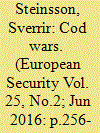

|
|
|
|
|
| Summary/Abstract |
The occurrence and outcomes of the Cod Wars defy both popular and academic expectations. Iceland, a microstate, essentially won four disputes against the UK, a great power. The two states furthermore belonged to a Western security community, sharing significant institutional, economic and cultural ties. This article reviews the history and international relations literature on the Cod Wars to explain and evaluate why the Cod Wars occurred and why Iceland won them. This article also explains what lessons international relations scholarship has learned from the Cod Wars for liberal international relations theory, realism and asymmetric bargaining.
|
|
|
|
|
|
|
|
|
|
|
|
|
|
|
|
| 20 |
ID:
103858
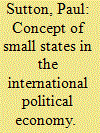

|
|
|
|
|
| Publication |
2011.
|
| Summary/Abstract |
This article examines the literature on small states from the related disciplines of international economics and international politics. By accident and design there is no generally agreed definition and characterisation of small states, although those advanced by the Commonwealth Secretariat and World Bank are most satisfactory. The role of the Commonwealth as a champion of small states is examined. Particular attention is paid to the concept of vulnerability and the challenges and opportunities to small states in a globalised world.
|
|
|
|
|
|
|
|
|
|
|
|
|
|
|
|
|
|
|
|
|